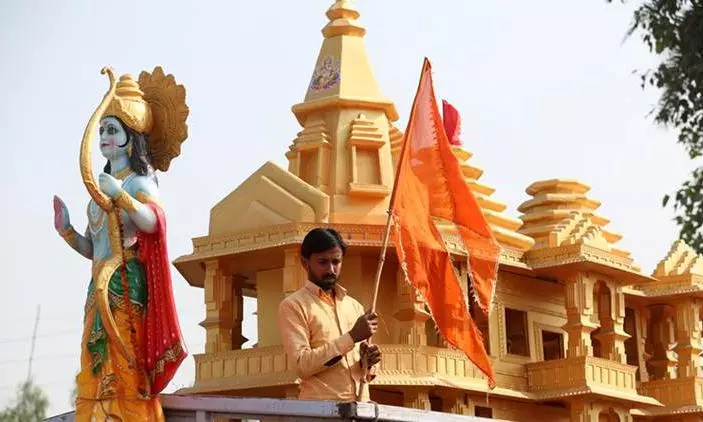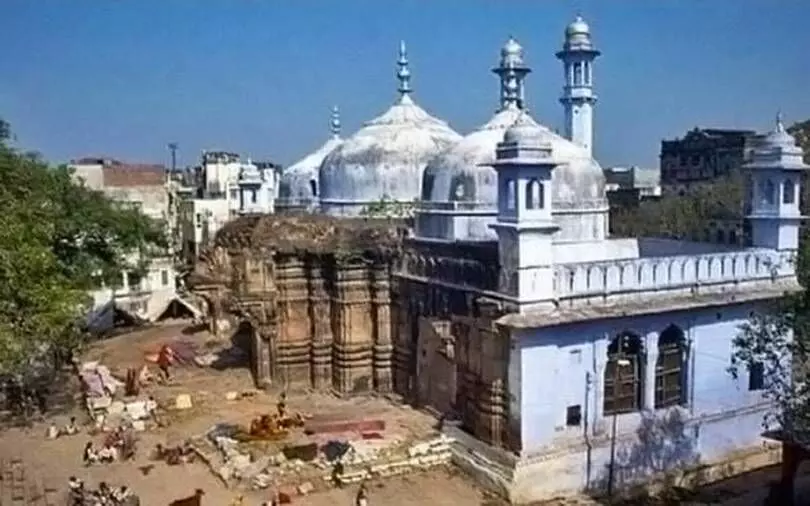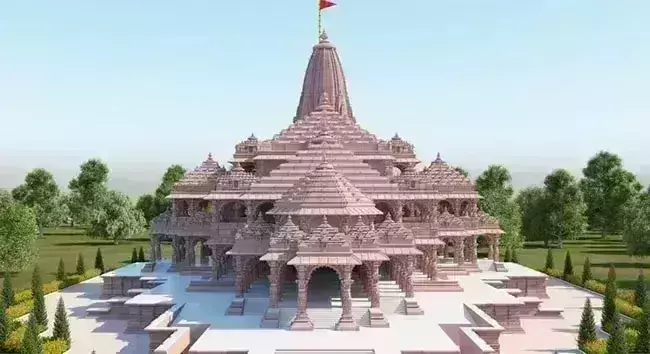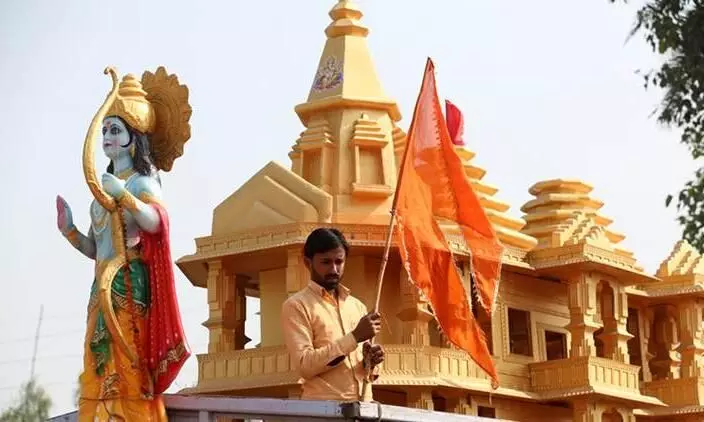

Truth behind land issue in Ayodhya
text_fieldsMuch heat and dust has been raised over what is seen as a scam in the sale and purchase of land for the proposed Ram temple in Ayodhya.
It is no surprise that the issue has got heavily politicized, for which all political parties are responsible. After all, whenever a ruling dispensation is seen being associated with an alleged irregularity, the opposition is bound to make it an issue. What blows such an issue into a huge controversy is when the ruling dispensation takes a plunge to come in defence of the alleged irregularity.
That is precisely what has happened to the alleged land scam in Ayodhya. No one had accused the Bhartiya Janata Party (BJP) of having anything to do with the sale or purchase of land for the Ram temple. The deal was struck between some private individuals and the Ram Janmbhoomi Teerth Kshetra Trust – the body constituted by the Union government to build the Ram temple. A land, measuring about 12,000 sqft, and about 2.5 km away from the core area of the proposed temple, was required by the Trust to rehabilitate people whose property had been acquired for construction of the temple.
What raised everyone's eyebrows was the revelation that while this land was sold by one private party to another for a price of Rs2 crores and barely 10 minutes later, it was purchased by the Temple Trust for Rs. 18.5 crores. How did the price of the same piece of land shoot up from Rs 2 crores to Rs 18.5 crores within a matter of 5 minutes? Later, it was discovered that yet another plot of land in the same vicinity and about the same size was purchased by the Trust on the same date for Rs. 8 crores. Interestingly, the seller happened to be the same person who owned the other plot of land. The only difference in the deal was that the earlier deal was struck through a middle-man while the second deal was carried out directly by the owner. But looking at the wide gap in the amount paid by the Trust, it was pretty evident that large scale mischief was done in the deals and huge pay-offs are bound to have been made.
The issue was brought into the public domain by former Samajwadi Party Minister Pawan Pandey and Aam Aadmi Party (AAP) MP Sanjay Singh, who furnished all relevant documents in support of their allegations. Their allegation made logical sense as the inflated price paid was suspected to have been shared in some underhand operation. What shocked everyone was that such large scale pilferage was being done out of donations received from sincere devotees in the name of Bhagwan Ram.
Instead of making an attempt to disprove the charges, a stunned Sangh Parivar chose to go on an offensive. Trust secretary Champat Rai who is a veteran Vishwa Hindu Parishad (VHP) leader, shot back, "hume toh Mahatma Gandhi ki hatya ka bhi aaropi banaya gaya tha (we were accused of killing Mahatma Gandhi also); hume koi farq nahi padhta aise aaropon se (such allegations make no difference to us)".
Later, he issued a press statement, which sought to emphasise, "we have not paid anything beyond the prevailing market price; in fact what we have paid is several crores less than the market price."
That was the line taken by all wings of the SanghParivar and the BJP leadership went overboard in holding a brief on behalf of the Trust. They also sought to claim that the price of Rs 2 crores was paid because the deal between those two parties was struck in 2011 against an agreement to sell.
However, what they all seemed to overlook were two salient points. Firstly, even if it were to be believed that the price of Rs. 2 crores was fixed in 2011, then why was this not mentioned in the final sale deed? Under the law, any terms agreed upon in an agreement to sell on a particular date must be necessarily mentioned in the final sale document. Secondly, the two witnesses in both the sale deeds happened to be the same persons. While one was Rishikesh Upadhaya, the BJP Mayor of Ayodhya, the other was Anil Misra, a member of the Ram Mandir Trust.
But neither the Trust officials nor BJP leaders were ready to answer any of these questions. All of them were busy chanting "those making allegations in the land deal were anti–Ram and they were always opposed to the temple." Their other plea is that the difference in the price arose on account of the land price shooting after the Supreme Court verdict in favour of the Ram temple in November 2019.
Obviously, they have nothing concrete to put up in defence of what seemed quite indefensible. In fact what had made matters worse for the trust and entire Sangh Parivar was the exposure of certain other land deals in the same vicinity, which have come in handy to substantiate the charges levelled against the Trust officials, who were busy giving themselves a clean chit.
In the first deal carried out on February 20, 2021, Ayodhya Mayor's nephew Deep Narain bought 890 square metres of land -- under Gata Number 135 at KotRamchandra, Haveli Awadh in Sadar Tehsil of Ayodhya from MahantDevendra Prasad Acharya for Rs 20 lakhs. According to the circle rate, fixed by the district magistrate, the value of this purchased land was about Rs 35.6 lakh. The circle rate of this land was Rs 4,000 per square metre. But, the temple Trust readily purchased it at Rs 28,090 per square metre.
In another deal, on the same day, Deep Narain sold a piece of 676.86 square meters of land to the Temple Trust for Rs 1 crore. As per the circle rate of Rs. 4,000 per sq metre, the cost of this plot of land was estimated to be around Rs. 28 lakhs. But the Temple Trust happily carried out its purchase from Deep Narain at the rate of Rs. 14,774 per sq metre.
Interestingly, both Ayodhya Mayor Rishikesh Upadhaya and Temple Trust member Anil Mishra, happen to be witnesses in each of the land deals. Anil Mishra is a well-known property dealer in the area and was known for his proximity to Mayor Upadhaya.
As if these deals were not enough to pin down the culprits, who had indulged in blatant violation of laws, the state government maintained studied silence on the issue. On the other, the state government was quick to lodge three FIRs against well-known former journalist Vineet Narain who had exposed another land scam by the Temple Trust secretary Champat Rai in his hometown Bijnore. Narain had relied on evidence provided by a family known for its proximity to Rai for five decades. According to that evidence, Champat Rai was grabbed land belonging to a Gau-shala run jointly by Rai's family and the complainant Alka Lahoti.
All evidence put out in the public domain against gross irregularities committed by some key functionaries of the Temple Trust clearly arouses suspicion. The Temple Trust chief, Mahant Nritya Gopaldas who is widely known for his integrity, has already conveyed that he was never taken into confidence on any land purchase for the temple. Both he and several other Ayodhya seers like Hanuman Garhi Mahant Dharam Das and Ramjanmbhoomi priest Satendra Das have favoured an impartial probe into the deals.
However, that has become a cause of worry not only for the temple trust officials but also for the top rung leaders of the entire Sangh Parivar. Perhaps the Sangh Parivar knows that any allegation of corruption in the land purchase or construction of the Ram temple will stick hard and could cost the BJP dear at the next state assembly elections in March 2022, when BJP was hoping to reap a harvest of votes in the name of the temple.



























